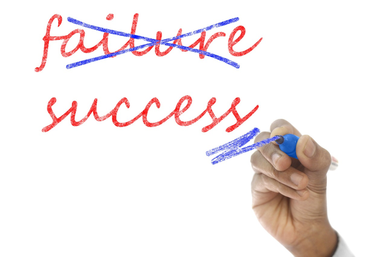 We’ve heard that failure is a necessary part of success. (Tweet it!) Now a study in the journal Frontiers in Behavioral Neuroscience adds a new twist. It finds that reflecting on past failures—by writing about them—may help us stay calm in the face of new challenges. According to an article in Forbes researchers from Rutgers, The University of Pennsylvania and Duke predicted that writing about a past failure would actually reduce a person’s stress level during a stressful situation in the present, whereas writing about a random topic would have no effect. To stress the participants, they subjected them to well-known social stress tests, such as preparing a speech in five minutes, which they had to deliver in front of a “speech expert.” As predicted, people who’d written about a past failure didn’t show the typical stress response (measured by the stress hormone cortisol) compared to the control group, who’d written about movie plots. The former group also did better on the tests of attention. Why does this connection exist? The researchers say that “writing about failures may make a new stressor seem subjectively less stressful by comparison.” In other words, reflecting on past stresses makes new ones seem not so bad. Have you ever used expressive writing to help you process a disappointment at work or in your personal life? What was its effect? To join the conversation, click "comments" above. If you would like to read more about creating a habit around masterful communication, check out our book: Be Quiet, Be Heard: The Paradox of Persuasion
2 Comments
 Have you asked anyone to give 110 percent lately? Or, to think outside the box? If so, your words might be having a counter-productive effect. According to a OnePoll survey of 2,000 American workers on behalf of communications technology provider Jive Communications https://wapo.st/2wZu20P, 27 percent of American workers acknowledged tuning out people who use this kind of jargon. We’re all guilty of resorting to workplace clichés at times. (Tweet it!) In fact, 72 percent admitted to habitually using these phrases. As John Pope, a senior vice president of Jive Communications says: “These phrases aren’t going anywhere anytime soon.” But, he added, “Our goal should be to use such jargon sparingly.” (https://fxn.ws/2FhGmbl). Here are the Top 10 phrases in order of cringe-worthiness:
If you would like to read more about creating a habit around masterful communication, check out our book: Be Quiet, Be Heard: The Paradox of Persuasion  Countless couples will marry this June. Not all of them will live happily ever after. But there is a scientific secret to maintaining lasting and fulfilling relationships. Researchers say: Simply be kind. (Tweet it!) “Longitudinal, experimental and evolutionary science all testify to the surprising power of kindness,” says Doug Carnine, PhD (www.feedkindness.com), University of Oregon Professor Emeritus and author of the book How Love Wins. Decades of research point to the centrality of kindness in stable, long-lasting relationships. In fact, kindness can even contribute to longevity itself. A study of 423 married seniors over a five-year period found that those who showed the most kindness to their spouses cut their risk of dying in half. In one study, researchers created small wounds on the arms of couples; the wounds literally healed faster in couples that were kinder to each other. As one researcher wrote, “The benefits of kindness may be more important than what you think, more so than regular physical activity and following a nutritious diet.” Being kind might be easier than you imagine. Carnine contends that we actually have a kindness instinct. “It’s one of our four basic human instincts that has evolved over thousands of years. The other three are survival, success and reproduction. The title of a recent article in Scientific American underscored the importance of the kindness instinct: Forget survival of the Fittest. It’s Kindness that Counts.” What’s the last kind thing you said or did for someone close to you? Can you remember receiving a kind act? To join the conversation, click "comments" above. If you would like to read more about creating a habit around masterful communication, check out our book: Be Quiet, Be Heard: The Paradox of Persuasion  It can be hard to say no, both because we want to accommodate people and also because we are sometimes insecure about standing up for our own priorities. (Tweet it!) Consequently, we can end up taking on too much, and perhaps avoiding people we fear will ask us to do more. But Chikodi Chima, a former VentureBeat staff reporter who helps startups with their public relations and marketing, contends that saying no is saying yes to freedom. “Having the confidence and foresight to say no makes you stand out. When you have clear goals, it’s easier to say no.” (https://bit.ly/2IiB6dX) Chima quotes Steve Jobs as an example of someone who used the power of “no” wisely. “I’m actually as proud of the things we haven’t done as the things we have done,” Jobs said at the 1997 Worldwide Developers Conference. “Innovation is saying no to 1,000 things.” Sure, we want to be liked and we don't want to offend. But in the end, don’t we also want to do what we truly believe in? If so, then “no” is one of they keys to success, says Chima. “The more clear our goals become, the easier and more powerful each no becomes. Saying ‘no’ takes practice, and it may backfire, but to me it’s the ultimate sign of maturity.” When was the last time you said no to someone else so you could pursue what mattered more to you? How did that experience turn out? To join the conversation, click "comments" above. If you would like to read more about creating a habit around masterful communication, check out our book: Be Quiet, Be Heard: The Paradox of Persuasion |
Archives
July 2024
Categories
All
|
|
Glaser & Associates, Inc.
Executive Offices 1740 Craigmont Avenue, Eugene, OR 97405 541-343-7575 | 800-980-0321 [email protected] |
© 2019 Glaser & Associates. All Rights Reserved.


 RSS Feed
RSS Feed